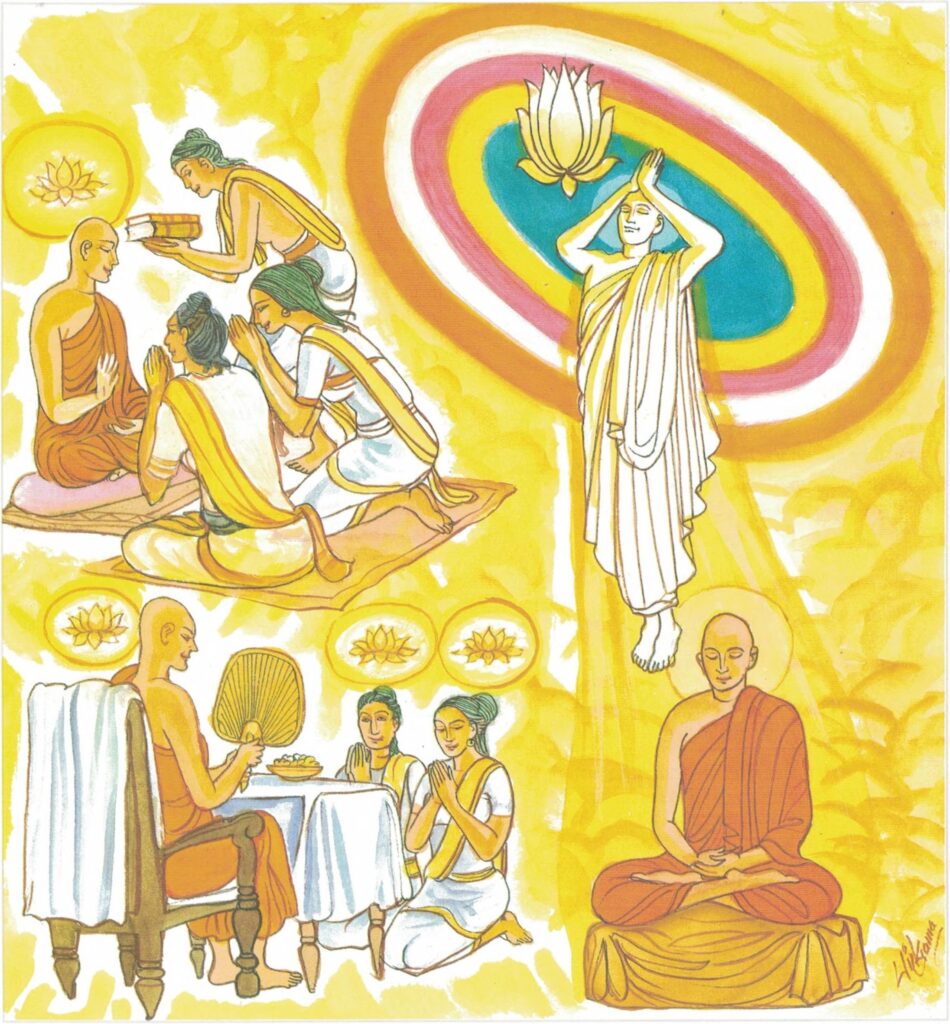Pali text, illustration and English translation of Dhammapada verse 354:
sabbadānaṃ dhammadānaṃ jināti sabbaṃrasaṃ dhammaraso jināti |
sabbaṃratiṃ dhammaratī jināti taṇhakkhayo sabbadukkhaṃ jināti || 354 ||
354. Gift of Dhamma surpasses all gifts, the Dhamma, its taste all other tastes beats, delight in the Dhamma bests other delights, destruction of craving conquers all ill.

The Story of the Questions Raised by Sakka
While residing at the Jetavana Monastery, the Buddha spoke this verse, with reference to four questions raised by Sakka, king of the devas.
On one occasion, at a meeting of the devas in the Tāvatiṃsa realm, four questions were raised, but the devas failed to get the correct answers. Eventually, Sakka took these devas to the Buddha at the Jetavana Monastery.
After explaining their difficulty, Sakka presented the following four questions:
- Among gifts, which is the best?
- Among tastes, which is the best?
- Among delights, which is the best?
- Why is the eradication of craving said to be the most excellent?
To these questions, the Buddha replied, “O’ Sakka, the Dhamma is the noblest of all gifts, the best of all tastes and the best of all delights. Eradication of craving leads to the attainment of arahatship and is, therefore, the greatest of all conquests.”
At the end of the discourse, Sakka said to the Buddha, “Venerable, if the gift of the Dhamma excels all gifts why are we not invited to share the merit whenever gifts of the Dhamma are made? I pray that, from now on, we may be given a share in the merit of good deeds.” Then the Buddha asked all the monks to assemble and exhorted them to share the merit of all their good deeds with all beings.
Since then, it has become a custom to invite all beings from the thirty-one realms (bhumis) to come and share merit whenever a good deed is done.
Explanatory Translation (Verse 354)
dhammadānaṃ sabbadānaṃ jināti sabbaṃ rasaṃ jināti dhammaratī
sabbaṃ ratiṃ jināti dhammaraso taṇhakkhayo sabbadukkhaṃ jināti
dhammadānaṃ [dhammadāna]: the gift of dhamma; sabbadānaṃ [sabbadāna]: all gifts; jināti: conquers; dhammaratī: the flavour of the dhamma; sabbaṃ rasaṃ [rasa]: all flavours conquers; jināti: conquers; dhammaratī: the love of dhamma; sabbaṃ ratiṃ [rati]: all loves conquer; taṇhakkhayo [taṇhakkhaya]: he who has got rid of craving; sabbadukkhaṃ [sabbadukkha]: all sufferings; jināti: conquers.
The gift of the Dhamma excels all gifts; the taste of the Dhamma excels all tastes; delight in the Dhamma excels all delights. The eradication of craving (i.e., attainment of arahatship) overcomes all ills (saṃsāra dukkha).
Commentary and exegetical material (Verse 354)
sabbadānaṃ Dhammadānaṃ: The gift of Dhamma conquers all gifts. The Buddha, elucidating this statement, further stated all the great and impressive material gifts to the Buddha, the Dhamma and the Sangha were made possible because, initially, the gift of Dhamma had been made. The gift of Dhamma persuaded the donors to make these other material donations. Even great saints achieved their high spiritual conquests entirely because of the gift of Dhamma they received.